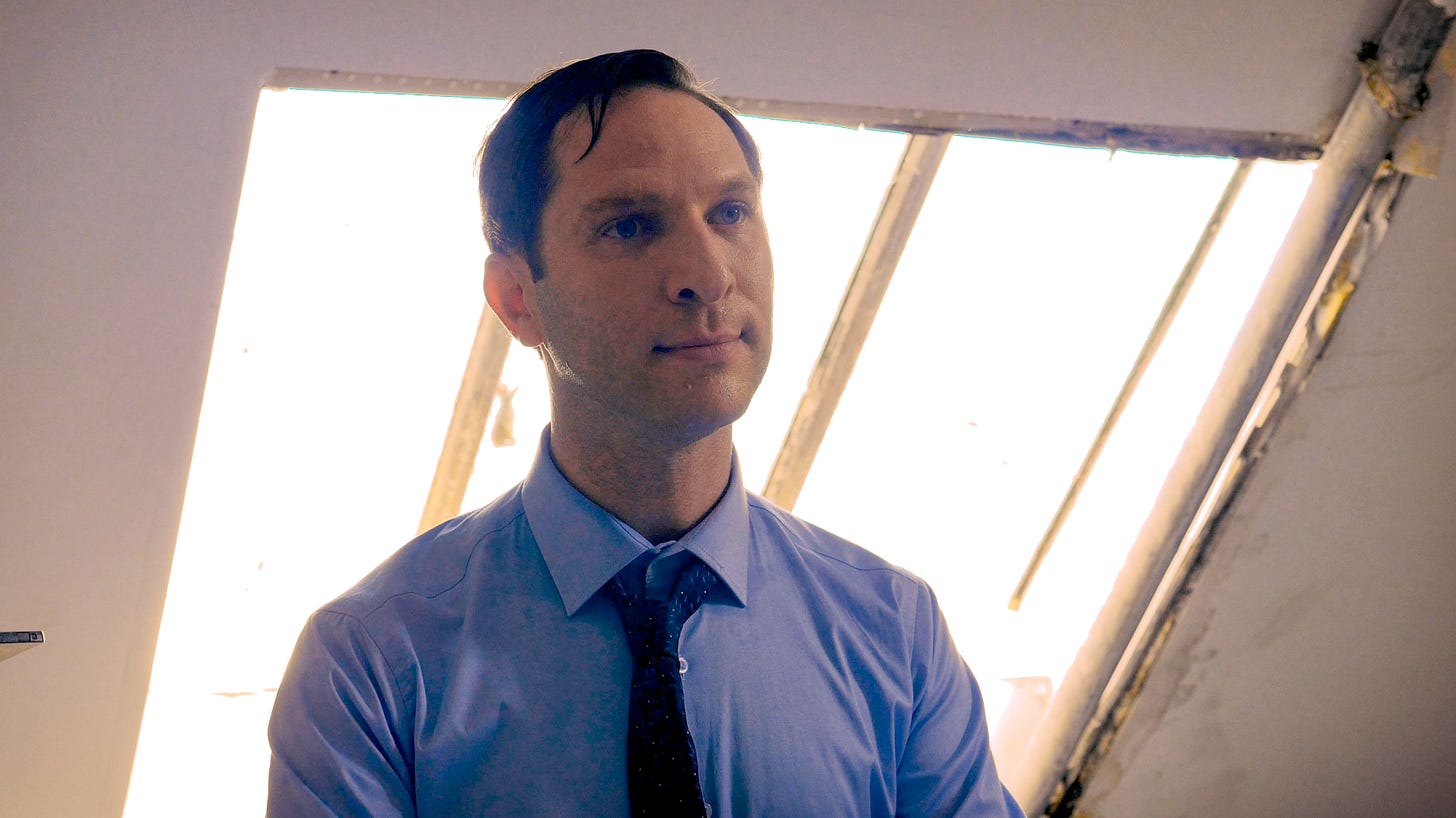In The Double Room, a 15 minute short by Martin Del Carpio, a man named Honor (Matt Pascua) is having a dream that he is in a forest filled with strange masks and chess pieces. A “chess clock,” with its twin clock faces, is seen on a log. Honor is having this dream as he struggles to wake up and prepare for an important job interview, and it seems his unconscious mind looks at the interview as being a strategic game, a game which involves masking your real nature. As the film progresses, the chess clock will come to be a potent image of the two worlds in which Honor lives: the mundane outer world of jobs and money, and a rich, inner world of visions and mysterious, light-filled beings. As a man of unusual sensitivity and creativity, he is naturally inclined toward the arts, and he aspires to be a writer. Unfortunately, our world does not appreciate its artists, and so Honor must struggle to survive. He wants to land some kind of day job so he can pay his bills.
Honor is constantly beset by visions, and this makes him seem strange to most people, both employers and girlfriends, as we learn from listening to his thoughts, which we hear as a voice-over while we watch him shave and carefully dress himself in his corporate disguise.
Over the course of the film, it becomes clear that Honor’s name holds an allegorical meaning. Although he does his best to fit in with corporate expectations and make a good impression during the interview, Honor’s very nature makes him unshakably honest, always true to his inner voice. While he’s getting ready, he impulsively tears up a letter of recommendation from a previous boss which he had planned to take to the interview, because of his frustration and disdain for the falsity and slick self-promotion which are expected of him in a work environment.
The center of the film is the interview scene. It’s a fascinating and strange encounter between two men so different that they might almost come from different planets. The interviewer (Dan Shaked) has a bizarrely mechanical manner, almost robotic, as he slickly rolls out the standard questions and remarks he’ll make to anyone applying for a job. Honor starts off almost making a good impression, but soon he is frankly telling the man that he really wants to be a writer, and that he “has the soul of a poet.” The interviewer, naturally, is not impressed, and he tells Honor that he’s not right for the position.
Del Carpio’s extraordinary approach to this scene, and indeed to the entire film, is that everything is seen as Honor subjectively experiences it. It’s not just the room where the job interview will take place that is “double,” for Honor, his entire life has a quality of doubleness. Because he is constantly experiencing strange visions and poetic, metaphorical versions of reality, the scene constantly shifts from the ordinary to the surreal and expressionistic. The room itself is dusty and dingy, with unpainted walls and a carpet covered with rubble, like a room in an abandoned factory. Since this is supposed to be an interview for a job with a powerful corporation, the room’s appearance may reflect Honor’s perception of the shabbiness, the corrupt and decaying nature of the corporate mindset. In certain moments, the interview turns into a chess game, with the interviewer holding a giant black king, while Honor struggles to oppose him with a tiny white pawn.
The real coup de cinema comes with the interviewer’s reaction to Honor’s honesty about being an artist, and about having no prior experience relevant to the job. In a gradual but stunning transformation, we watch as Honor’s honesty literally “blows the guy’s mind.” The interviewer has a full-scale meltdown, but it’s the meltdown that a robot or computer would have, if it encountered some data that its circuits weren’t equipped to handle and it was sent into a loop, gradually crashing the entire program. Some subtle but powerful special effects by frequent Del Carpio collaborator William Murray give a graphic visual form to this meltdown. One can view this entire spectacle as Honor’s visual metaphor for what must be a common experience for him: meeting people whose worldview and basic assumptions are deeply challenged by meeting him, people for whom it is impossible to process his steadfast integrity. When confronted with someone who refuses to play the game, a corporate automaton such as the interviewer senses that the entire consensus reality underpinning his world-view is falling to pieces.
A powerful epilog scene shows Honor, still in his corporate clothes, encountering a grainy black and white video of himself as we saw him in the first scene, unshaven and undisguised, in his undershirt. The image is an effective poetic shorthand, which embodies his inner conflict, trying to survive and be true to his vision, in a world that neither understands nor appreciates his unique abilities.
In The Double Room, Del Carpio takes the inner world of a sensitive, creative artist, and gives it visible form for the viewer, revealing the profound experience of doubleness experienced by those of us who are in touch with other levels of reality. There is a constant mismatch between the world’s assumptions and expectations, and the inner reality of people like Honor. By dramatizing this mismatch, this doubleness, Del Carpio gives a voice to the frustration and disappointment experienced by many artists, trying to make their way in a world that ignores their gifts.
My articles on experimental film are freely available to all, but are supported by monthly and annual donations from readers. Please consider becoming a paid subscriber to support my work. Thank you.






